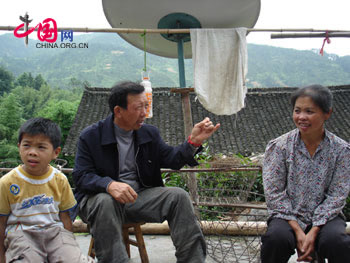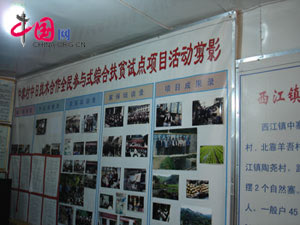There is a small village in the deep and verdant mountains near Kaili city in southeast Guizhou. At the end of the village lives a happy family of four. The 47-year old father Meng Renjun has worked in Shenzhen and Guangzhou for years and has come back home this year. His 44-year old wife Zhang Yingju stays at home to take care of their only son Meng Jisheng (the Chinese abbreviation of "family planning"). Jisheng has an older sister who is also a city worker but he is Meng Renjun's 7th child.
|

|
|
Meng Renjun (M) talking with his wife Zhang Yingju (L) and his son Meng Jisheng (L) [China.org.cn]? |
As ethnic minority Miao, Meng and his wife are allowed to have two children according to the family planning policy. After having their first daughter, they tried to have another child but all of their 5 new babies died shortly after birth. The couple was sad and puzzled. The Kaili city family planning department sent doctors to give them a sound health examination after they knew Meng's story and found Zhang had hemolytic disease, which could destroy the red blood cells of the fetus, and cause severe anemia to newborn children and, in the worst case, stillbirth. They were provided with free treatment then. Little Jisheng was born the following year and Meng and his wife gave their son his name to thank the family planning department. Jisheng is 9 year old now and is one of the smartest students in his class. Talking about his son, Meng Renjun's eyes glistened: "He is so smart that I believe he can go to college in the future."
Meng's family is only one of the hundreds of thousands of people benefiting from the new family planning policy. The government is investing more than 10 million yuan (US$1.46 million) every year to improve health condition of population and reduce birth defects. Hospitals offer comprehensive prenatal examinations to pregnant women and proper medical treatment, and publicize health and healthy lifestyle information widely.
A local grandmother told China.org.cn that in the past, it was the job of midwives to help pregnant women give birth in the village, a practice which was often unsafe. Now all women travel to hospitals in Kaili city for pregnancy checks and to have their babies. Some villagers have even forsaken the traditional preference for sons – those who have only a girl will get 4,000 yuan (US$584), while 2,000 yuan (US$292) is offered for a sole boy.
As a province with a huge population and an underdeveloped economy, Guizhou has struggled in past decades to identify a more effective and humane approach to family planning, in an effort to bring tangible benefits to local people. The Guizhou government's new idea is to coordinate birth control with social and natural resources, economic development, and public health.
Besides providing a better health service, the local government has also cooperated with international organizations to eliminate poverty and improve the quality of the local population.
Southeast Guizhou Miao-Dong Autonomous Prefecture (SGMDAP) is one of the three autonomous areas in Guizhou where 80 percent of local population are ethnic minorities. The Miao ethnic group is one of the oldest and biggest minorities. Zhongzhai village in Leishan County, located in the southwest of SGMDAP, has 134 families numbering 677 Miao people. People here still follow traditional Miao customs.
|

|
|
A poster of the PPPRM international project [China.org.cn] |
However, this beautiful village was poor in terms of both economy and health. The People's Participatory Poverty Reduction Model (PPPRM)?Project, jointly managed by Japan's International Cooperation Agency (JICA) and the National Population and Family Planning Commission of China, began in Leishan County in 2005.
This project is unique as it directly involves the villagers and seeks to improve their economic condition from a healthcare perspective. Besides providing hardware such as health service facilities and a methane tank, JICA put a lot emphasis on "software" building. They invite professionals to teach villagers about agriculture and healthy reproduction with visual materials that are easy to understand. The villagers in Zhongzhai now understand that good health of mothers and children equals wealth. Women will actively go for a physical check twice a year. The village committee helps local people to organize various part-time clubs such as the culture and art association. Thus villagers can make handicrafts to sell in their spare time.
|

|
|
Embroidery made by local women?[China.org.cn] |
A revolving fund is also helping many villagers to achieve a significant increase in income. JICA has invested a total of 70,000 yuan (US$ 10,249) and the village committee has distributed the funds to 30 families. Each family got an average of 2,000 yuan (US$292) to buy livestock and supplies such as cows and seeds. Li Weishi bought a calf for 2,000 yuan (US$292) and sold it six months later for 4,800 yuan (US$702). Such examples can be seen throughout the village. Though not all families can repay the fund promptly, they can hold on to it without extra interest. This program is helping Miao people to escape from poverty step by step.
The provincial government has also put a lot of effort in raising the quality of population by proper education and cultural activities in rural areas. The "three new" policy (new rural areas, new rural families and new farmers) implemented in many villages serves as an important part of this new family planning strategy. Dilou, a village of 3,382 people on the western border of Guizhou, is a typical example.
|

|
|
Free library built by the village committee [China.org.cn] |
The policy began in 2005 and consists of training programs on farming and breeding techniques and publicizing initiatives about family planning and education. The change of life in their hometown attracted many young people who had worked in big cities return home with new ideas. They have raised a fund to reward those children who are enrolled by key high schools and universities. 82 students have been sponsored since 2005.
The village committee has also built a "culture and education center" including a free library and sport and entertainment clubs. This significant transformation in the attitude of villagers towards bringing up their children heralds a bright future for the community and for Guizhou as well.
Background:
China's national family planning policy has been in place for about thirty years, bringing dramatic changes to society. Though China's population is still rising, the birth rate and natural growth rate have declined on an annual basis. There has been a profound shift in ideas of fertility as well. People now tend to pay more attention to the quality of population.
(China.org.cn by Ren Zhongxi, June 9, 2009)